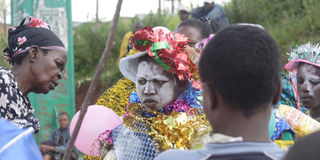Breaking: Autopsy reveals how Cyrus Jirongo died
Premium
Circumcisers stick knives into girls as leaders trade blame

A caregiver inspects girls who had just undergone through the FGM in Nyabikaye village in Kuria East. photo/FILE
What you need to know:
- Alarm sounded as parents in Central herd their daughters into the time-warped tradition that has consigned thousands into early marriages and misery
- Teenagers tell tales of being pushed to abandon girlhood before their time
Her forlorn and retreating eyes make her look much older than she actually is.
She speaks hesitatingly, her eyes darting from side to side as one pursued. And she could be. For after being lured by her parents to the circumciser’s knife, 12-year-old Jane Wairimu* does not know what could be next.
“We were taken to our Cucu’s (grandmother’s) home in April with my cousins where we were told that we were going to be ‘made’ women,” she told Saturday Nation at the Maela IDP Camp in Naivasha, as the world marked Day of the African Child last week.
After they arrived in Turi, Nakuru, they were taken to an old woman’s hut.
“When Cucu arrived, our aunts forced us to open our legs before a woman cut off our private parts,” said the former Standard Five pupil at Maai Mahiu Primary School.
To be respectful
“We were then sewn together. We bled a lot and I was just screaming. Some of the girls we were with fainted. When we attempted to put our legs together, we were slapped on thighs and told to be respectful. Up to now, I have never known why they did this to me,” she says, sobbing.
She claims she was given a lesso and a cooking pot after the ordeal and told that she was now ready to start a home.
“No one told me how painful it would be. Though I had become a woman, I still wanted to remain a girl. I was forced to avoid my friends and not play their games, which I was told were silly. Even though I’m still young, I feel like an old woman,” she adds.
This, coupled with ridicule from her schoolmates, pushed her to drop out of school.
Wairimu is not alone. Such are the tribulations of hundreds, perhaps thousands, of girls from central Kenya — a region considered civilised and prosperous — who undergo Female Genital Mutilation.
The assault, our investigations revealed, is perpetrated under the guise of Mungiki, an outlawed cult, and by a cross section of the Akorino believers. It is estimated that at least 100 girls undergo the cut annually in the region.
Areas notorious for the cut are Molo, Nginda, Maela and several IDPS camps in Naivasha, where many young girls have succumbed to the pressure of their parents to face the knife.
They are curcumcised during school holidays and some of the parents who spoke to Saturday Nation say they are proud that they have done the right thing.
“We would like to uphold our tradition and this will only be through circumcision,” says Wairimu’s father John Njuguna.
The 56-year-old vows that all his daughters will undergo the practice before they get married. His wife, Josphine Wangui, who also underwent the cut, believes it has no harm.
“I gave birth to 10 children and they are all healthy,” she says.
The practice, she says, has helped her “contain” her four daughters’ sexual drive.
“They do not have any urges, unlike the ones who are not cut. They realise that once they are cut, their bodies belong only to their husbands.
“At least I do not have to deal with unwanted pregnancies or HIV/Aids,” Wangui, a staunch Akorino, says.
The practice has now alarmed authorities, with teachers attributing the high school dropout rates among girls in Maai Mahiu, Ndabibi and Kongoni to FGM.
Dropout rates
They say the pupils do not report back to school after undergoing the practice since they are married off.
Besides early marriages, deteriorating health of the girls who undergo the cut also keeps them out of school.
Stigma, according to Kipkunyo Primary School teacher Florence Kerecho, also drives circumcised girls to abandon studies.
“The rest of the pupils ridicule their classmates who are circumcised, which makes them not to come to school,” she says.
And as the circumcisers stick the knife into the next girl, stakeholders are busy trading blame.
Esther Njeri, a social worker Naivasha, attributes increased cases of FGM laxity among law enforcers.
Gilgil District children’s officer Eunice Njuguna also blames police for failing to arrest and prosecute perpetrators of the time-warped culture.
She believes penalties imposed by courts on such offender are a part on their wrists.
Ms Njuguna wants courts to adopt a landmark ruling that sent shock waves through communities that circumcise girls in 2010.
In the unprecedented judgment, a Narok court convicted and sentenced a man and a woman to 10 years each in jail after a 12-year-old girl bled to death in a botched circumcision at Naroosura area.
Sasiano Nchoe, who was being initiated into womanhood, died on August 18, 2008, after bleeding for five hours. Her body was buried immediately in a shallow grave.
Traditional circumciser Nalang’u Ene Sekut and Sasiano’s father Kantet ole Nchoe are still paying the price behind bars.





